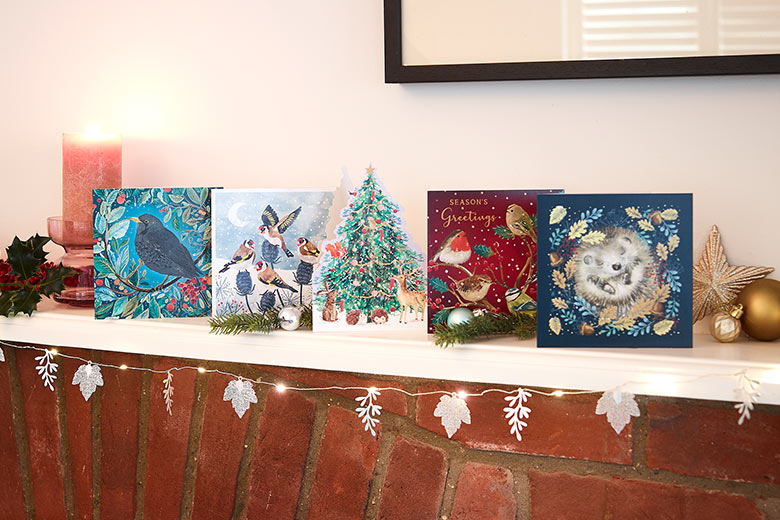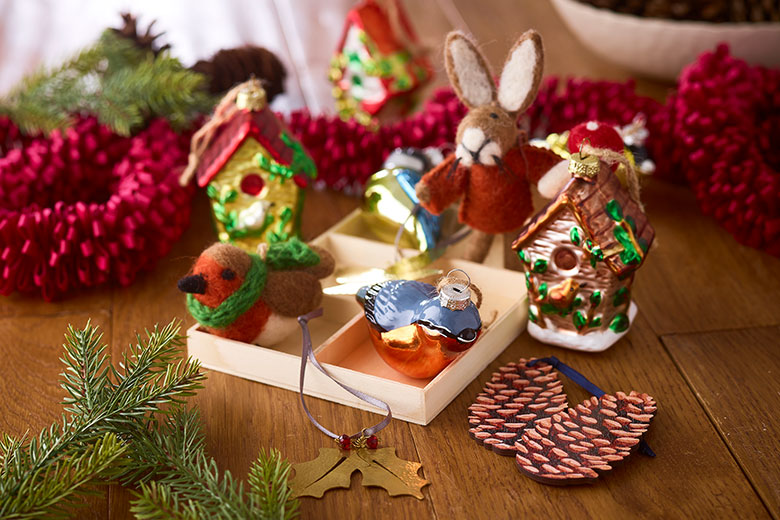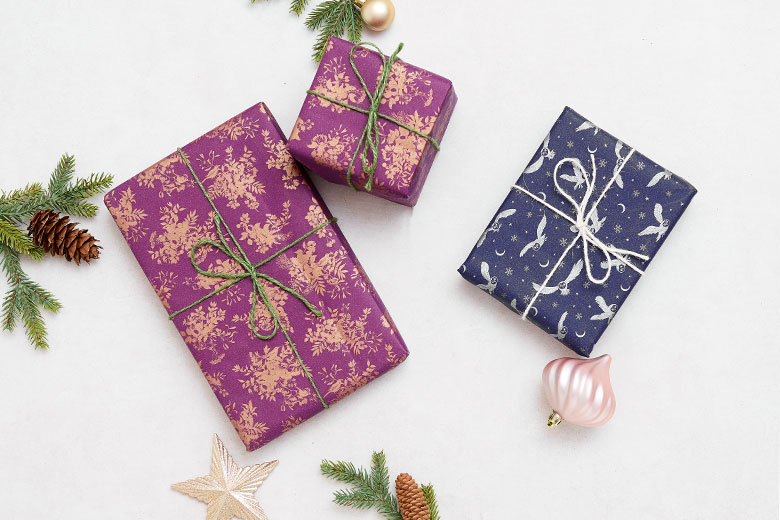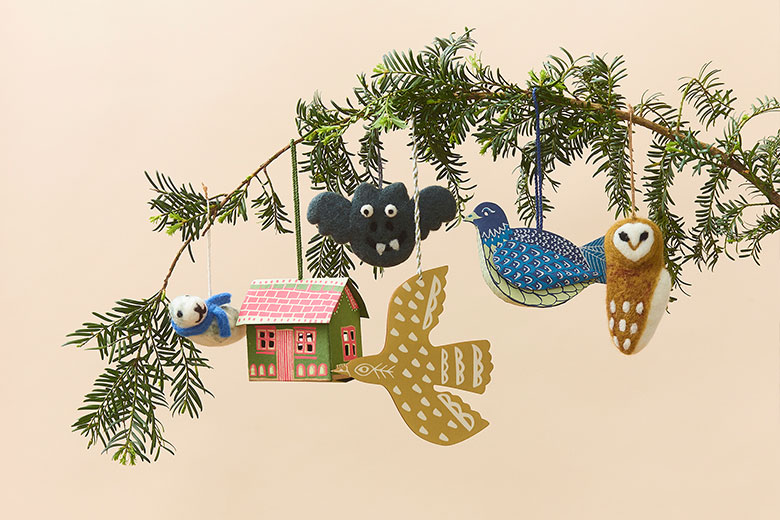How to Have a Sustainable Christmas
Christmas is the most wonderful time of the year, but it’s also often touted as a time of overconsumption and waste, thanks to things like plastic decorations, glittery cards and non-recyclable wrapping paper. Thankfully, you don’t have to have a wasteful Christmas; there are lots of small things you can do and swaps you can make to ensure your festive season is as eco-friendly and sustainable as possible.
1. Buy recyclable Christmas cards
One of the easiest ways to make your Christmas eco-friendly is by sending recyclable Christmas cards. Many cards have foil, plastic or glitter on them, making them unrecyclable. Thankfully all RSPB charity Christmas cards are completely recyclable, glitter and foil-free and have been designed and printed in the UK on sustainably sourced paper and card, using vegetable-based inks.

2. Choose crackers with plastic-free prizes
Whilst Christmas crackers can be a lot of fun, many crackers are notorious for containing an abundance of plastic, throw-away gifts. At RSPB Shop, however, we pride ourselves on sustainability and so all of our crackers are completely plastic-free and contain gifts that last. Choose from delicious chocolate Robins, fun glider toys, limited edition RSPB pin badges or our personal favourite, wooden tree decorations that you can re-use, year after year.
3. Gift sustainably
It’s important to think about the gifts you’re buying this festive season, too. Consider whether the gift you’re giving is good for the environment. Will the recipient get a lot of use out of it? Does it come with minimal or plastic-free/recyclable packaging? Choose gifts that you know the recipient will use and enjoy for years to come.
4. Decorate the eco-friendly way
Many decorations are unfortunately made from plastic or foil, which are impossible to recycle. There are, however, lots of sustainable alternatives when it comes to Christmas decorations. Instead of tinsel, for example, why not opt for homemade paper garlands? They’re a fun activity and look great too. We also have a hand-painted tree garland available if you don’t fancy getting crafty. For tree decor, veer away from plastic hanging decorations and choose wooden, glass or felt decorations instead.

5. Real or fake tree?
Speaking of the Christmas tree, there is a lot of debate over whether it’s better to buy a real or fake one when it comes to sustainability. Whether you opt for real or fake, there are ways you can make your choice more sustainable.
If you choose a real tree, make sure you buy it locally, ideally from an organic farm, and that it is FSC certified. This means it’s been grown in a responsibly managed way. Once Christmas is over, ensure you recycle the tree – many local councils will accept trees for recycling, or you could chop the tree up to make your own firewood, or a cosy shelter for bugs and other wildlife.
If you choose a fake tree, the key here is to ensure you know it’s going to stand the test of time, and that you’ll get years and years use out of it. If you know it’s something you might change your mind on a few years down the line, it’s probably worth just getting a real tree instead.
The best, most sustainable option is to invest in a potted, living Christmas tree. When Christmas is over, remove the decorations and place the tree outside to be reused again and again, year after year.
6. Give back to wildlife
Winter might be a time of presents, good food and merriment for us humans, but for wildlife it’s a whole other story. The harsh winter months can make things tricky for birds and other wildlife, as they need more energy to fight the cold, and food and water is scarce. There are ways to help, however, including providing garden birds with high-fat foods such as suet to give them a boost, and leaving leaves and log piles out for insects to shelter amongst.

7. Use recyclable wrapping paper
Non-recyclable wrapping paper is one of the biggest issues when it comes to sustainability at Christmas time. Wrapping paper that is covered in glitter, foil or has non-recyclable additives will most likely end up in landfill, so it’s of paramount importance that we opt for recyclable wrapping paper. All of RSPB wrap is 100% recyclable, so you can rest assured you’re wrapping sustainably this Christmas. It’s also worth noting that things like foiled ribbons, glittery tags and even sticky tape are best to be avoided as they can’t be recycled either. We’d recommend sticking to paper decorations or twine when decorating your parcels, and opt for paper tape to ensure your wrap is 100% recyclable. We have a range of recyclable tags, plastic-free tape and twine available to help decorate your presents.
8. Cut out food waste
Food waste is a big problem at this time of year, due to overbuying and overcooking. Help mitigate this by planning your meals carefully, thinking about portion sizes and ensuring you freeze any leftovers. Make sure you compost any vegetable peels and donate any unopened food after Christmas.
9. Spend time in nature
Don’t forget to appreciate the great outdoors at this time of year. Even in the cold, the natural world is beautiful and getting wrapped up warm and spending the morning walking around a reserve is a great, low-cost way to get out and about. Being outside and appreciating nature in all its glory will re-emphasize why having a sustainable Christmas is so important, and it helps boost health and wellbeing, too.

10. Reuse and recycle
The key thing for sustainability is to ensure you reuse and recycle as much as possible. Make sure any decorations you buy will be used for years to come, opt for recyclable packaging as much as you can and when Christmas is over, store things away to be reused next year. Whilst all RSPB Christmas cards are recyclable, if you do receive any non-recyclable cards or wrapping paper, why not cut them up and use them for gift tags or decorations next year?
Will you be taking any of these ideas on board this Christmas?